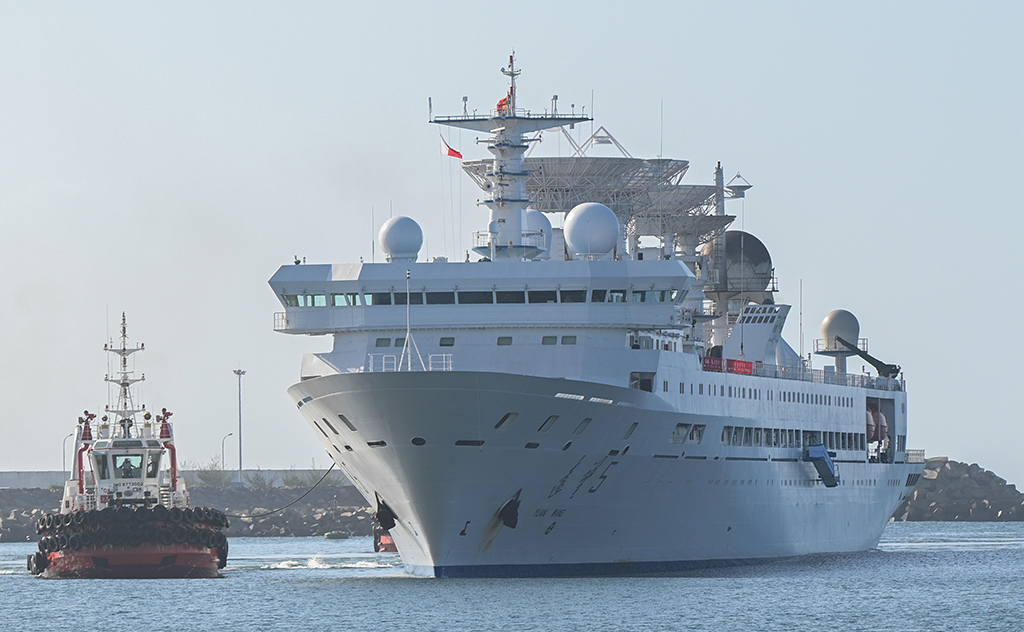HAMBANTOTA, Sri Lanka: A Chinese research vessel bristling with antennas and communication gear docked at Sri Lanka's Chinese-run port of Hambantota on Tuesday despite concerns from India and the United States about its alleged spying activities. The Yuan Wang 5 entered the deep-sea port after securing permission to enter Sri Lankan waters on the condition it would not engage in research, port officials said. It was originally due to arrive last week, but Colombo asked Beijing to defer the visit following objections by India, which shares Western concerns about Chinese activities in the region.
But on Saturday, after intense negotiations, Sri Lanka announced a U-turn, saying permission was restored to dock at the southern port and remain for six days for refuelling and taking in other supplies. "We are granting the same facilities that we extend to all other countries," government spokesman Bandula Gunawardana told reporters. "All these countries are important to us." Chinese ambassador to Sri Lanka Qi Zhenhong said the visit of Yuan Wang 5 was part of "normal exchanges between the two countries".
"China and Sri Lanka enjoy outstanding friendship," Qi told reporters at a ceremony to welcome the ship. Shipping analytics websites described the Yuan Wang 5 as a research and survey vessel, but according to Indian media it is a dual-use spy ship. There was no customary military band to welcome the vessel, but a small group of traditional Kandyan dancers and drummers performed on a red carpet. Also dockside were several lawmakers, but there were no senior politicians or other dignitaries in attendance.
"Long live China and Sri Lanka friendship," read a red-and-white banner on an upper deck of the vessel, which had at least four satellite dish antennas pointed skywards. Men in white shirts and black trousers stood on deck waving Chinese and Sri Lankan flags as the vessel was pushed alongside the main jetty.
The Hambantota port has been run by the Chinese since 2017, when they took it on a 99-year lease for $1.12 billion, less than the $1.4 billion Sri Lanka paid a Chinese firm to build it. New Delhi is suspicious of Beijing's increasing presence in the Indian Ocean and influence in Sri Lanka, seeing both as firmly within its sphere of influence.
Both India and the US have raised security concerns over the ship's visit to Sri Lanka, with New Delhi lodging a complaint with Colombo. China has said it was "completely unjustified for certain countries" to cite "security concerns" to pressure Sri Lanka, especially at a time when the island is facing an unprecedented economic crisis.
The vessel's activities were "in line with international law and international practice, and do not affect any country's security or economic interests," Chinese foreign ministry spokesman Wang Wenbin told reporters. "They should not be interfered with by third parties." A day before the arrival of the vessel, India gifted a Dornier 228 surveillance aircraft to Sri Lanka in a bid to bolster the island's maritime surveillance capabilities.
The Chinese ship was allowed into port on the condition it keeps its Automatic Identification System (AIS) switched on while in Sri Lankan waters and does not carry out scientific research. According to Indian reports, the Yuan Wang 5 could be employed for space and satellite tracking and has specific uses in intercontinental ballistic missile launches.
Chinese debt
Sri Lanka borrowed heavily from China between 2005 and 2015, and in 2017 relinquished control of the Hambantota port, which is located on major East-West shipping lanes. Sri Lanka said it could not afford to repay China for building the port and handed over the facility on a 99-year lease.
China is Sri Lanka's biggest bilateral creditor, owning over 10 percent of the island's foreign debt. Beijing's support is essential for Colombo to restructure its external borrowing to qualify for an International Monetary Fund bailout. On August 4, President Ranil Wickremesinghe "reiterated Sri Lanka's firm commitment to the one-China policy" after US House Speaker Nancy Pelosi visited Taiwan, calling for "non-interference in the internal affairs of countries". - AFP











